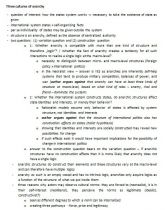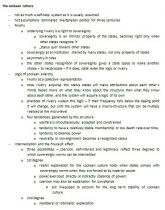Studijní materiál: Three cultures of anarchy
Skrýt detaily | Oblíbený- Kvalita:78,5 %
- Typ:Studijní materiál
- Univerzita:Univerzita Karlova v Praze
- Fakulta:Fakulta sociálních věd
- Kategorie:Humanitní vědy
- Podkategorie:Politologie
- Předmět:Mezinárodní vztahy
- Autor:clean.bandit
- Ročník:3. ročník
- Rozsah A4:6 strán
- Zobrazeno:997 x
- Stažené:1 x
- Velikost:0,1 MB
- Formát a přípona:MS Office Word (.doc)
- Jazyk:anglický
- ID projektu:9383
- Poslední úprava:09.01.2017
- question of interest: how the states system works -> necessary to take the existence of state as given
- international system states = self-organizing facts
- per se individuality of states may be given outside the system
- structure is an anarchy, defined as the absence of centralized authority
- two questions: (1) variation question and (2) construction question
o 1: Whether anarchy is compatible with more than one kind of structure and therefore „logic“? / Whether the fact of anarchy creates a tendency for all such interactions to realize a single logic at the macro-level?
o necessity to distinguish between micro- and macro-level structures (foreign policy x international politics)
o in the Neoralist view - answer is YES as anarchies are inherently self-help systems that tend to produce military competition, balances of power, and war (author argues against that anarchy can have at least three kinds of structure at macro-level, based on what kind of roles - enemy, rival and friend - dominate the system)
o 2: Whether the international system constructs states; do anarchic structures affect state identities and interests, or merely their behavior?
o Rationalist models assume only behavior of states is affected by system structure, not identities and interests
o author argues against that the structure of international politics also has construction effects on states (holist hypothesis)
o showing that identities and interests are socially constructed may reveal new possibilities for change
o if such effects exist it would have important implications for the possibility of change in international politics
o answer to the construction question bears on the variation question - if anarchic structures have no construction effects then it is more likely that anarchy does not have a single logic
- international system states = self-organizing facts
- per se individuality of states may be given outside the system
- structure is an anarchy, defined as the absence of centralized authority
- two questions: (1) variation question and (2) construction question
o 1: Whether anarchy is compatible with more than one kind of structure and therefore „logic“? / Whether the fact of anarchy creates a tendency for all such interactions to realize a single logic at the macro-level?
o necessity to distinguish between micro- and macro-level structures (foreign policy x international politics)
o in the Neoralist view - answer is YES as anarchies are inherently self-help systems that tend to produce military competition, balances of power, and war (author argues against that anarchy can have at least three kinds of structure at macro-level, based on what kind of roles - enemy, rival and friend - dominate the system)
o 2: Whether the international system constructs states; do anarchic structures affect state identities and interests, or merely their behavior?
o Rationalist models assume only behavior of states is affected by system structure, not identities and interests
o author argues against that the structure of international politics also has construction effects on states (holist hypothesis)
o showing that identities and interests are socially constructed may reveal new possibilities for change
o if such effects exist it would have important implications for the possibility of change in international politics
o answer to the construction question bears on the variation question - if anarchic structures have no construction effects then it is more likely that anarchy does not have a single logic


